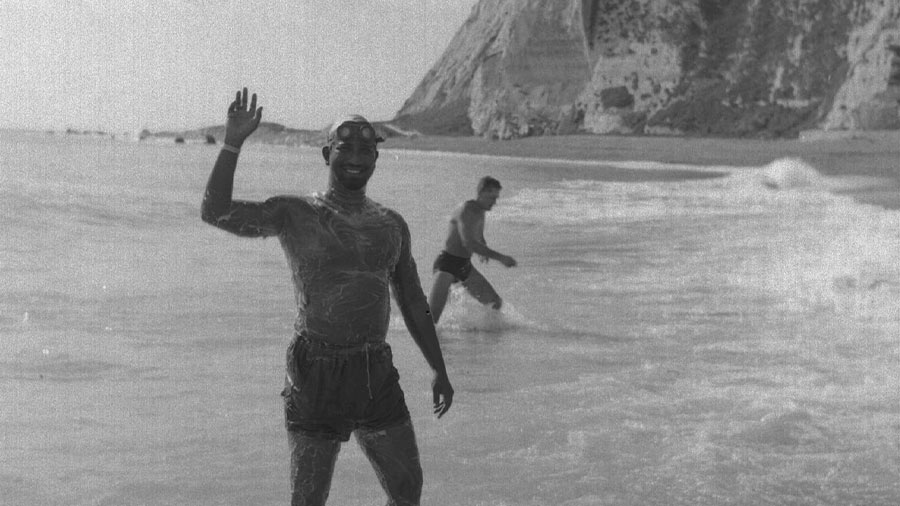September 27, 1958. A young Indian emerged from the English Channel at Calais. Tired but jubilant, he carried with him the hopes and aspirations of countless millions back in his country.
Mihir Sen from India had shown that the impossible, the unthinkable was achievable if you wanted it well enough. The first Asian to swim across the English Channel, he clocked 14 hours 45 minutes — the fourth fastest time ever. This was the first of many achievements.
In 1966, he became the only man to swim the oceans of the five continents. His feat included the successful conquest of the Palk Strait, Dardanelles, Bosphorus, Gibraltar, and the entire length of the Panama Canal – an unbelievable accomplishment that earned him a place in the The Guinness Book of Records as the ‘world’s greatest long-distance swimmer’.
How the Bengal ‘son’ rose
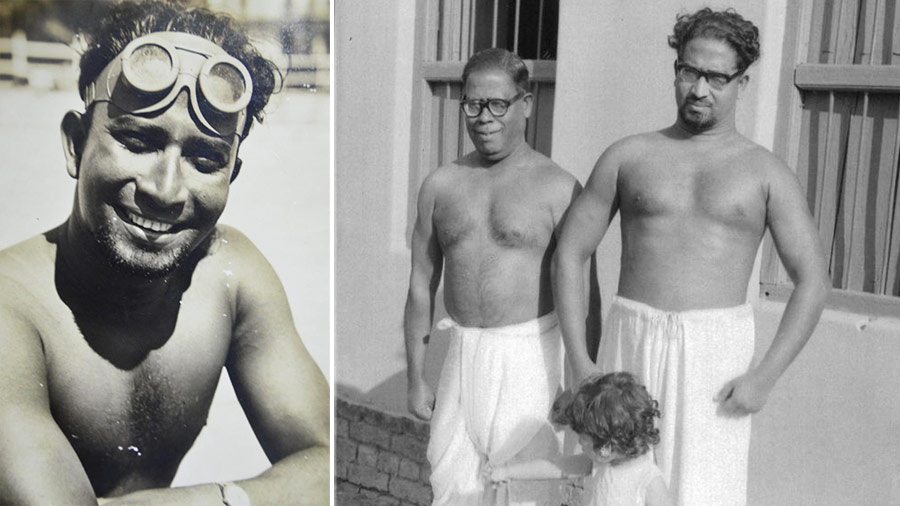
(Right) Mihir Sen with his father Dr Ramesh Sengupta outside his ancestral home in Cuttack, Orissa
Mihir Sen was never trained as a swimmer. Born into a Bengali middle-class family in Bengal’s Purulia district in 1930, he learnt to swim just like other youngsters in the village. His father was a doctor who lived a simple rural life. The family relocated to Cuttack in Odisha when Sen was about eight years old. There, they stayed as part of a joint family. He went on to attain a degree in law from Ravenshaw College under Utkal University despite the family’s financial hardships. Sen’s mother’s constant support and efforts to supplement his father’s meagre income helped him in his academic career.
Across the continents
Headstrong and intensely determined as he had always been, Sen became hell-bent on going to England for further studies, an idea that seemed impossible given the circumstances. But he had made up his mind and persuaded industrialist, pilot and politician Biju Patnaik to create an opportunity for him. Patnaik relented after months of perseverance and, in 1950, a determined 19-year-old set sail with a sum of 10 pounds and a dream to realise.
Life had never come easy to Mihir and in England, too, he had to do many odd jobs just to survive before he landed up at India House where a reluctant V.K. Krishna Menon, the Indian ambassador then, agreed to help him out. Assured thus, Sen endeavoured to complete his studies from Lincoln’s College. With hardly any money to spend and only a handful for survival, he immersed himself in the library and largely taught himself. His energetic way of living saw him becoming involved with the activities of the Youth House on Campden Road, a place where students from all over the world would congregate. This was also the time where and when he met and fell in love with his wife-to-be, Bella Weingarten, of Hungarian origin, who was to play a stellar role in his life.
The English Channel ‘resolve’
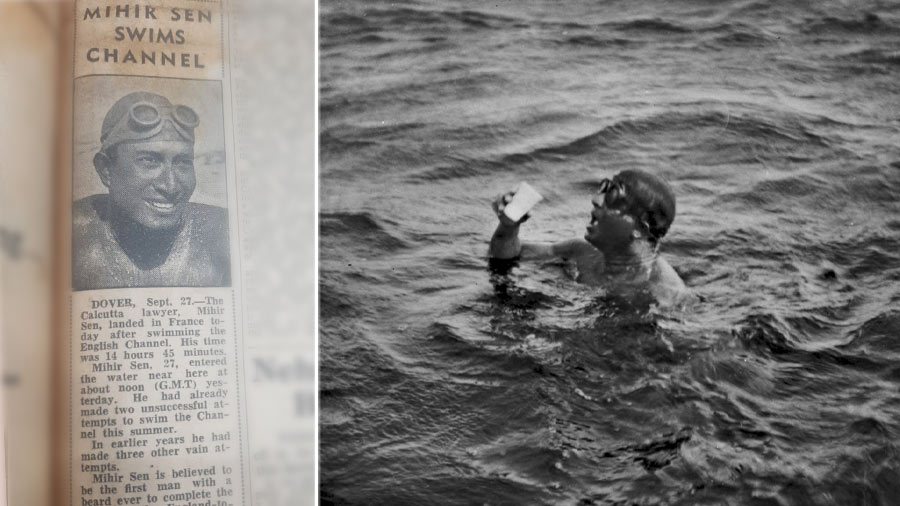
A clipping from The Statesman dated September 29, 1958, reporting Sen’s victory
It was around this time that Sen chanced upon a newspaper article chronicling the efforts of a young American woman, Florence Chadwick, as she swam across the English Channel. As if in a flash, Sen decided that he would have to do something similar, if not to accomplish a personal feat but also to send a message back to his fledgling nation and countrymen that the time had come to be brave and shake off the shackles of indecisiveness that years of colonial rule had imposed.
Sticking to the trait that he had picked up from his mother, Sen never allowed himself to have second thoughts and so began training for the swim in the warm water pool of Central YMCA in Tottenham Road. For months thereafter, the lack of a trainer, his inability to buy nutritious food that was so essential for the build-up to such an arduous task or the fact that swimming in the cold winter days often made him sick could do nothing to budge Sen from his resolve. Realising the need to improve from his ability of a simple overarm style to the more essential ‘crawl’, he persevered to infuse the element of speed into his swimming without which crossing the channel would remain a dream.
Weathering the attempts
The English Channel at its narrowest between Dover In England and Calais in France is a good 33 miles and for swimmers, the route is treacherous because of currents, tides, strong winds and huge waves, as well as sea-borne creatures. But there was no deterring Sen, and he made his first attempt in August 1955. The effort proved futile as the weather gods went foul and Sen had to retreat. There were several attempts thereafter but all met the same fate until the eventful seventh attempt in September 1958. That attempt began in bright sunshine but with sunset, the temperature dropped drastically. Sen swam on though even as he shivered in the cold. As he himself said later, thoughts of quitting did come across his mind, realisation that it was he alone who was subjecting himself to this physical torture with no idea of the gains or worth it would fetch – Mihir, true to his self, kept going.
Victory, at last, and many more
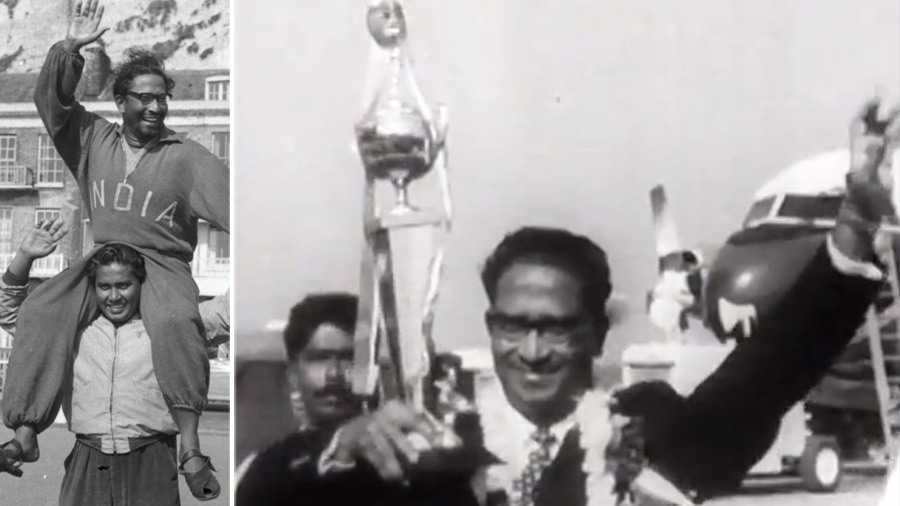
Mihir Sen exults after tasting success
After what seemed an eternity, the French coastline hovered into view. A few more arduous strokes later, Sen felt rock under his feet. Tears in his eyes, Sen realised that he had achieved an impossible dream. An endeavour, a tryst with the odds that he himself endured alone, now lay completed, overcome.
The 27-year-old returned to India where he was given a hero’s welcome not only by the people but also by the Indian government, which honoured him and his incredible feat with the Padma Shri in 1959 and the Padma Bhushan in 1967.
Not content to rest on his laurels, Sen followed up his achievement by swimming across the Palk Strait between India and Sri Lanka in 25 hours and 36 minutes on April 5-6, 1966; the Straits of Gibraltar linking Europe to Africa in eight hours and one minute on 24 August; the Dardanelles — Gallipoli, Europe to Sedulbabir, Asia Minor in 13 hours and 55 minutes and last but not the least, the full length of the Panama Canal in 34 hours and 15 minutes on October 29-31.
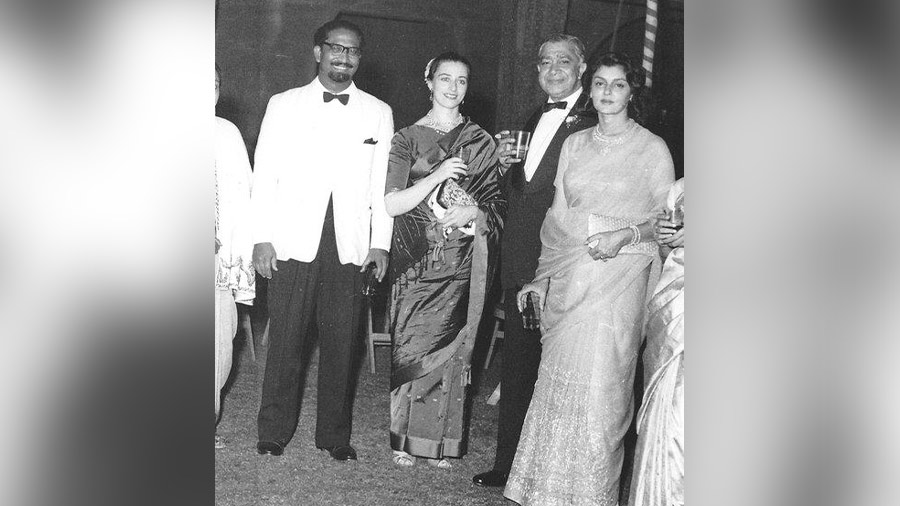
Sen and his wife Bella Weingarten (second from left) and (extreme right) Maharani Gayatri Devi
Life beyond swimming
Back in India, Sen began practising law, attained unprecedented success but withdrew when he grew disillusioned by it. He then began the life of an industrialist and as fate would have it soon became the second-largest silk exporter in the nation – a feat for which he was acknowledged and lauded by the Indian government and other organisations.
Sen’s success fetched him offers in politics, which he refused but went on to contest the election as an Independent candidate. Thereafter, followed a life of dejection and ill health before he died almost penniless June 11, 1997, in Kolkata.
‘Mihir’ means the sun or the rays of the sun and Sen lived up to his name with a life of fierce determination, dedication and perseverance in the face of seemingly unsurmountable challenges to emerge with but one outcome – victory — despite the rather ignominious end.
A daughter (Supriya Sen) reminisces
Fathers are their daughters’ most powerful role models.
My father’s inspirational life motivates me to face every challenge with grit and determination. He constantly told us that “life is like a turbulent ocean, no matter how many times the breakers come crashing down hard, pushing you under, you must always fight your way back to the surface”.
He was a pioneer in the field of sports undertaking challenges attempted by no other Indian. He believed that the mind was a powerful tool — all you need to do is focus on what you want — eat it, dream it 24x7, and the mind will manifest it for you. That is how he accomplished his swims.
He was a warm, positive, highly disciplined individual with a magnetic personality who loved his country passionately. I am so proud to be the daughter of this great man.
